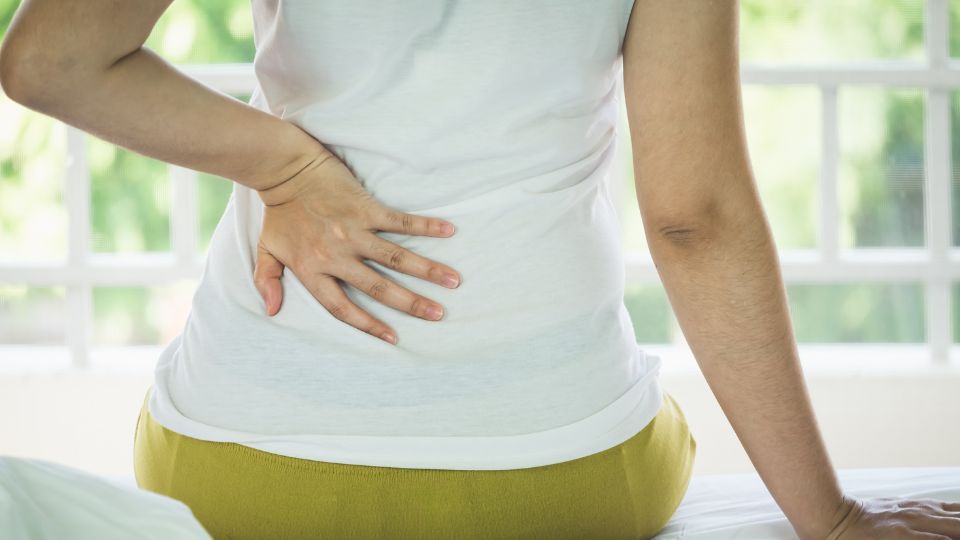Why Do I Have Back Pain From Sitting Too Long, And What Do I Do About It?

It’s true that when you sit for a long time, you can experience lower back pain. This can cause debilitating effects on your lifestyle, ranging from personal to professional effects.
But a natural question is, “why does my back hurt when I sit?” So in this article, let’s discuss the various causes of lower back pain from sitting too much. We’ll also cover how to relieve lower back pain from sitting.
That way, you can make the right lifestyle choices and receive the proper treatment to resolve your issues.
What Is Lower Back Pain?
Lower back pain is when the vertebrae designated L1 through L5 cause pain. Oftentimes, poor sleeping positions, and bad posture such as a slouch position, can put extra strain on these joints or discs. Therefore, the answer to “can sitting too long cause back pain” is yes.
Your discs are cushions that are filled with fluid that help your vertebrae from rubbing together. Underlying medical conditions can also cause lower back pain from sitting. Let’s look at some of the various popular causes from pain when sitting down.:
What Causes Back Pain From Sitting Too Long?
Let’s cover some some common culprits that create back pain after sitting too long:
Herniated Discs
If you have a herniated disc, then the pressure will cause the disc to be out of position. This creates additional strain in the area, pain, and even numb sensations. This is due to the extra stress on your spinal cord.
Herniated discs can happen via repetitive motion, extreme injuries, or simply part of aging. If you experience these symptoms, you should visit a center for pain management in Chicago today.
Sciatica
The sciatic nerve runs from the base of your spine down to your legs. If you have a bone spur, poor posture, or other events, then it can cause pain on your sciatic nerve.
It feels like a shock running down from your buttocks to your lower leg. It can often radiate from the tailbone to other parts of your body.
Muscle Strains
A lumbar strain in your back can cause lower back pain. If you overstretch a muscle or strain it, then it can inflame the area, cause stiffness and pain. Strains can sometimes go away on their own by correcting your posture.
Degenerative Disc Disease
If your lower spine receives damage, then you may have degenerative disc disease. Your annulus fibrosus can tear. This is what contains your nucleus pulposus.
In other words, the soft center of your discs can be damaged. They won’t always heal themselves due to a low blood supply in this area. Therefore you should seek pain management doctors to understand how to treat this problem at the nerve root itself.
Otherwise, the pain could radiate into your limbs, thighs, buttocks, and more. It can get worse over time without proper treatment.
Spinal Stenosis
If you have arthritis, tumor, or injury in your spine, then it can narrow the spinal canal. When nerves are compressed, they cause pain and weakness throughout your whole body and locally in this area.
Additional Weight And Lifestyle
If you are carrying around excess pounds, it can put extra pressure on your musculoskeletal system. Additionally, kidney stones, gallbladder issues, and other health conditions can cause lower back pain.
How To Fix Lower Back Pain From Sitting
There are various options when it comes to how to relieve back pain from sitting: Massages, yoga, medications, heating, icing, and postural changes can help.
Additional medical treatment may be appropriate. Nerve blockers, acupuncture, laser therapy, medications, and even physical therapy have been known to aid with lower back pain.
Ultimately, you should visit a doctor to make sure that your symptoms aren’t a sign of a more serious underlying medical problem.
Resolving Lower Back Pain From Sitting Today
Make An Appointment with Gateway Spine and Pain Physicians today. You can minimize your pain and maximize your lifestyle.
We specialize in helping people with pain management using diverse and comprehensive care. Various types of treatments or medications may be used. We will utilize the best care approach to ensure that we address the underlying cause for your back, neck, or other pain.
